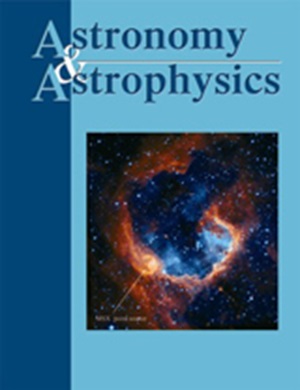Efficient modeling of correlated noise
IF 5.8
2区 物理与天体物理
引用次数: 6
Abstract
Correlated noise affects most astronomical datasets and to neglect accounting for it can lead to spurious signal detections, especially in low signal-to-noise conditions, which is often the context in which new discoveries are pursued. For instance, in the realm of exoplanet detection with radial velocity time series, stellar variability can induce false detections. However, a white noise approximation is often used because accounting for correlated noise when analyzing data implies a more complex analysis. Moreover, the computational cost can be prohibitive as it typically scales as the cube of the dataset size. For some restricted classes of correlated noise models, there are specific algorithms that can be used to help bring down the computational cost. This improvement in speed is particularly useful in the context of Gaussian process regression, however, it comes at the expense of the generality of the noise model. In this article, we present the S + LEAF noise model, which allows us to account for a large class of correlated noises with a linear scaling of the computational cost with respect to the size of the dataset. The S + LEAF model includes, in particular, mixtures of quasiperiodic kernels and calibration noise. This efficient modeling is made possible by a sparse representation of the covariance matrix of the noise and the use of dedicated algorithms for matrix inversion, solving, determinant computation, etc. We applied the S + LEAF model to reanalyze the HARPS radial velocity time series of the recently published planetary system HD 136352. We illustrate the flexibility of the S + LEAF model in handling various sources of noise. We demonstrate the importance of taking correlated noise into account, and especially calibration noise, to correctly assess the significance of detected signals.相关噪声的高效建模
相关噪声影响着大多数天文数据集,忽略对其进行考虑可能会导致错误的信号探测,尤其是在低信噪比条件下,而这往往是追求新发现的背景。例如,在利用径向速度时间序列探测系外行星的领域,恒星的变异性可能会导致错误的探测。然而,由于在分析数据时考虑相关噪声意味着要进行更复杂的分析,因此通常使用白噪声近似。此外,计算成本可能过高,因为它通常是数据集大小的立方倍。对于某些有限类别的相关噪声模型,可以使用特定算法来降低计算成本。这种速度上的改进在高斯过程回归中尤为有用,但这是以牺牲噪声模型的通用性为代价的。在本文中,我们提出了 S + LEAF 噪声模型,该模型允许我们在计算成本与数据集大小成线性比例的情况下,考虑一大类相关噪声。S + LEAF 模型尤其包括准周期核和校准噪声的混合物。噪声协方差矩阵的稀疏表示以及矩阵反演、求解、行列式计算等专用算法的使用,使得这种高效建模成为可能。我们应用 S + LEAF 模型重新分析了最近发表的行星系 HD 136352 的 HARPS 径向速度时间序列。我们展示了 S + LEAF 模型在处理各种噪声源时的灵活性。我们证明了考虑相关噪声,特别是校准噪声对于正确评估检测到的信号的重要性。
本文章由计算机程序翻译,如有差异,请以英文原文为准。
求助全文
约1分钟内获得全文
求助全文
来源期刊

Astronomy & Astrophysics
ASTRONOMY & ASTROPHYSICS-
自引率
27.70%
发文量
0
期刊介绍:
Astronomy & Astrophysics is an international Journal that publishes papers on all aspects of astronomy and astrophysics (theoretical, observational, and instrumental) independently of the techniques used to obtain the results.
 求助内容:
求助内容: 应助结果提醒方式:
应助结果提醒方式:


